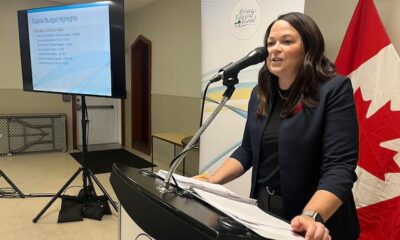Health
P.E.I. Expands Nurse Practitioners’ Role to Tackle Doctor Shortage

As Canada grapples with a significant shortage of family doctors, Prince Edward Island (P.E.I.) is proactively addressing the issue by expanding the role of nurse practitioners in primary care. With over 35,000 residents currently registered without a family physician, the province is turning to nurse practitioners to help alleviate the burden on the healthcare system.
The Nurse Practitioner Association of Canada highlights that nurse practitioners are increasingly recognized as essential primary care providers. Their responsibilities include diagnosing medical conditions, ordering lab tests, prescribing medications, and performing various procedures. According to Ellen Christie, president-elect of the association, the expanding scope of practice for nurse practitioners is crucial as healthcare demands rise and the supply of providers struggles to keep pace.
In P.E.I., nurse practitioners are crucial to a collaborative healthcare model, where they work alongside family doctors, social workers, pharmacists, and other healthcare professionals in at least 17 Patient Medical Homes. This team-based approach aims to reduce patient wait times and alleviate burnout among healthcare workers. Christie noted, “P.E.I. is certainly leading the country when it comes to the shift and the implementation of interdisciplinary, team-based care.”
Approximately 50% of the members of the P.E.I. Nurse Practitioners Association (PEINA) serve in panel positions, acting as primary care providers for groups of patients. Candice Rochford, secretary of PEINA, emphasized the significant impact of nurse practitioners, stating that they care for anywhere from 300 to nearly 1,000 patients each, thereby providing essential primary care for thousands of Islanders.
As Canada celebrates National Nurse Practitioner Week from November 9 to 15, PEINA advocates for the provincial government to grant nurse practitioners the ability to operate independent clinics. This would allow nurse practitioners to set flexible hours that accommodate patient needs, rather than adhering to a traditional nine-to-five schedule.
In contrast, provinces like Alberta already enable nurse practitioners to run independent, publicly funded clinics, while Saskatchewan is piloting a government-funded primary care model led by nurse practitioners. Additionally, some provinces permit privately run clinics operated by nurse practitioners.
P.E.I. is also anticipating an updated interpretation of the Canada Health Act, set to take effect in April 2026. This change will classify primary care services provided by nurse practitioners as “medically necessary,” thereby allowing provincial governments to use federal healthcare funding typically allocated for physicians to support nurse practitioners. “That would be a great opportunity for our government to leverage our nurse practitioners,” Rochford remarked.
The province boasts the highest number of nurse practitioners per capita in Canada, according to a report from Health P.E.I. earlier this year. Rochford concluded, “There’s certainly leverage there to significantly improve access for patients in P.E.I.” By embracing the vital role of nurse practitioners, P.E.I. is taking significant steps toward addressing the ongoing healthcare challenges faced by its residents.
-

 Politics1 week ago
Politics1 week agoSecwepemc First Nation Seeks Aboriginal Title Over Kamloops Area
-

 World4 months ago
World4 months agoScientists Unearth Ancient Antarctic Ice to Unlock Climate Secrets
-

 Entertainment4 months ago
Entertainment4 months agoTrump and McCormick to Announce $70 Billion Energy Investments
-

 Lifestyle4 months ago
Lifestyle4 months agoTransLink Launches Food Truck Program to Boost Revenue in Vancouver
-

 Science4 months ago
Science4 months agoFour Astronauts Return to Earth After International Space Station Mission
-

 Technology3 months ago
Technology3 months agoApple Notes Enhances Functionality with Markdown Support in macOS 26
-

 Top Stories1 month ago
Top Stories1 month agoUrgent Update: Fatal Crash on Highway 99 Claims Life of Pitt Meadows Man
-

 Sports4 months ago
Sports4 months agoSearch Underway for Missing Hunter Amid Hokkaido Bear Emergency
-

 Politics3 months ago
Politics3 months agoUkrainian Tennis Star Elina Svitolina Faces Death Threats Online
-

 Politics4 months ago
Politics4 months agoCarney Engages First Nations Leaders at Development Law Summit
-

 Technology4 months ago
Technology4 months agoFrosthaven Launches Early Access on July 31, 2025
-

 Top Stories3 weeks ago
Top Stories3 weeks agoFamily Remembers Beverley Rowbotham 25 Years After Murder





















